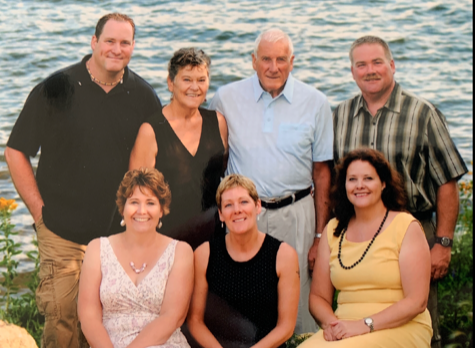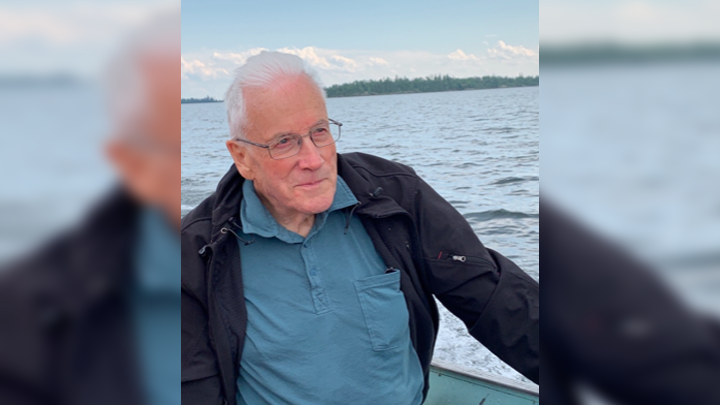It might be the connection to Johnny Cash that raises the most eyebrows.

After all, what would one of the biggest names in music ever be doing all the way up in La Ronge, Saskatchewan?
But that’s just the kind of allure northern Saskatchewan holds for many – even those with the money and resources to travel anywhere choose it as a destination.
Cash, along with his wife June, frequented a fishing outfitter on Lac La Ronge named Red’s Camps in the 1970s and ’80s.
Once, in the early 80s, Red’s owners Ron and Evelyn Mackay asked the legendary country star if he would perform for the camp’s guests and local community.

“He said ‘sorry ma’am I don’t do that,'” recalled Ron and Evelyn’s son Scott. “But a day later he came back and said ‘but I will bring my whole band up!'”
Johnny, June and their band ended up performing a benefit concert in La Ronge that raised money to help build the Mel Hegland Uniplex Arena. The arena still stands today, playing host to the La Ronge Ice Wolves.
“Dad was on the rink committee at the time, and so he was very instrumental in setting all that up,” Scott said. “He loved to socialize and be the host.”
Ron Mackay passed away in Saskatoon’s Royal University Hospital Monday at the age of 85 of complications from COVID-19.
His family spoke to Global News from La Ronge on Thursday afternoon, remembering a family man with a true love for exploring and developing northern Saskatchewan.
According to Scott his dad had a “love for movement, adventure and doing new things” that began early.
Mackay was born in 1934 in Semans, Sask., growing up a “small-town kid” playing hockey and baseball.

He took interest in the army cadets and found he had a knack for marksmanship, once winning a national rifle competition.
He took his first steps towards a career in the outdoors in 1956 after being accepted into the Saskatchewan Department of Natural Resources’ coveted Conservation Officer Training School (the program attracted over 100 applicants for 12 trainee positions in its inaugural year in 1952, according to the Saskatchewan Association of Conservation Officers website).

Get daily National news
His first posting as a conservation officer was in Wadena, Sask. in 1958. He met and married his wife Evelyn and fathered his first daughter, Mikki, soon after.
The family grew as Ron’s work took the Mackay’s about northern Saskatchewan, first to Cumberland House, then to La Ronge, to Buffalo Narrows, Prince Albert and eventually back to La Ronge where Ron and Evelyn purchased Red’s Camps in 1971.
By the next year, Red’s Camps was running as what would become a lifelong family business venture.

Over the next decades it became a hub for fishers and others who shared Ron’s love for nature.
It offered a motel and cabins on its lake, boats, local Indigenous guides (northern lakes are “extremely difficult” to navigate, Scott added) and more. Scott says that at its peak, Red’s Camps outfitted 100 fishermen and women a day who would spend their time exploring the lakes, catching fish for lunch and supper that the Mackays would help prepare.
“Community was very important to dad. He really enjoyed having fun and people in general,” Scott recalled.
Red’s Camps also played host to business and industry as the uranium mining grew in Saskatchewan.
“It was a very interesting place to grow up with all these different world travelers and celebrities,” Scott remembered. “You name ’em, we met ’em.”
Scott said Ron’s other contributions to the community of La Ronge include helping start the local Kinsmen Club, chamber of commerce and air cadets squadron.
He was also part of the provincial tourism committee for four years.
“He was a very ‘shop local’ guy,” Scott said. “And knowing my father, he got his voice across and the north got its fair attention.”
Ron and Evelyn built their dream home on an island on Lac La Ronge and retired there, staying as long as they could while travelling the world.
Mackay is survived by his wife and five children — Mikki, Scott, Rae-Lynn, Lisa and Grant — as well as 16 grandchildren.
The Mackay family hasn’t dwelled much on the disease now making its way to the farthest reaches of the globe. Instead, they’re cherishing memories like sitting down for family dinners that sometimes swelled to 30 people when tourists would join the Mackays for a bite.

Grant Mackay recalled a “perfect day” when his father took the time out of a busy afternoon at Red’s to show him how to change the tire on his bike – a life lesson learned from a man who “loved to impart wisdom” and would give time to anybody who asked.
Scott Mackay and his wife Michelle did want to add, though, that Ron had been practicing social distancing and were largely isolating themselves.

“It’s so important to listen and self-monitor and just stay home right now,” Michelle said. “Having other people go through this and not being with immediate family is hard. I just don’t want this to happen to anyone else.”
If you’ve never been to Saskatchewan’s north, Scott Mackay says its thousands of kilometres of lakes and boreal forest are unmissable. And if you do make it up to La Ronge, Scott says there’s a good chance you’ll find the work of Ron Mackay beneath your feet.
“When we first moved north there was one provincial representative in a lot of those communities and that was the resource officer,” he said. “Mom and dad were trailblazers.”

Questions about COVID-19? Here are some things you need to know:
Health officials caution against all international travel. All international travellers returning to Saskatchewan are required to self-isolate for 14 days in case they develop symptoms and to prevent spreading the virus to others.
Symptoms can include fever, cough and difficulty breathing — very similar to a cold or flu. Some people can develop a more severe illness. People most at risk of this include older adults and people with severe chronic medical conditions like heart, lung or kidney disease. If you develop symptoms, contact public health authorities.
To prevent the virus from spreading, experts recommend frequent handwashing and coughing into your sleeve. They also recommend minimizing contact with others, staying home as much as possible and maintaining a distance of two metres from other people if you go out.
For full COVID-19 coverage from Global News, click here.









Comments
Want to discuss? Please read our Commenting Policy first.